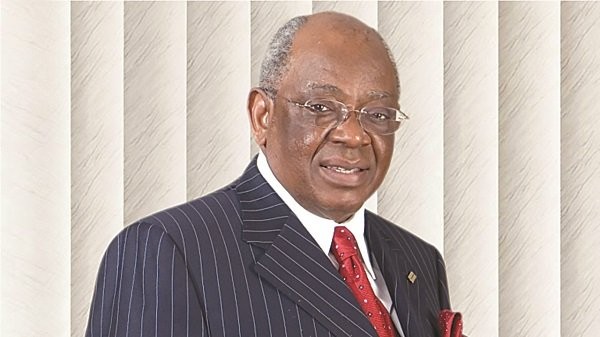FCMB founder buys more shares in Yuletide deals
The octogenarian founder of FCMB Group Plc and Nigeria’s oldest surviving stockbroker, Otunba Subomi Balogun, spent the eve of the Christmas buying more shares in his four decades old financial services group.
Trading data on insider dealings at the Nigerian Stock Exchange (NSE) showed that Balogun in several deals that started on December 18 and concluded on December 24, 2020 acquired more shares in FCMB through the secondary market.
The deals involved more than 5.12 million ordinary shares of 50 kobo each, in what an analyst described as a show of confidence on the attractiveness of the financial services holding group. The prices for the deal ranged between N3.0154 and N2.9674, with an average price of N2.9925. Market analysts said the deal were symbolic.
Latest report of FCMB Group for the third quarter ended September 30, 2020 showed considerable growths across key performance indicators. Gross earnings rose to N146.43 billion in third quarter 2020 as against N135.82 billion in third quarter 2019. Profit before tax increased from N12.80 billion to N15.85 billion. After taxes, net profit rose from N10.79 billion in third quarter 2019 to N13.90 billion in third quarter 2020. Earnings per share thus improved from 54 kobo to 70 kobo.
Balogun is generally regarded as the undisputable grand patron and master of the financial markets. A doyen, pioneer and role model of entrepreneurial banking in Nigeria; Balogun in 1979 single-handedly set up the first wholly Nigerian-owned merchant bank and trained generations of many leading Nigerian bankers.
Under his leadership as chairman and chief executive, First City Merchant Bank Limited (FCMB), for two decades, experienced steady and uninterrupted growth, a feat hitherto considered beyond the ability of a Nigerian.
As a true mark of his astuteness, Balogun’s FCMB is the only surviving bank out of the three merchant banks that were in existence at that time as both Icon and NAL have been submerged in the winds of change continuously blowing through the financial markets.
Without gainsaying, the contributions of Balogun to the development of the capital market were particularly outstanding. He, as the head of Icon Securities Limited, was the one responsible for bringing to the market, landmark issues such as the first public offers of Daily Times and UAC of Nigeria to the public. At that time, Daily Times, which was originally owned by a foreign proprietor with a few Nigerian Shareholders dominated the media in Nigeria. UACN was then virtually the second largest employer in the country only next to the government of the Federation.
Balogun set out to permanently change the face of investment banking in Nigeria with his resignation in December 1977 as executive director of Icon Limited (Merchant Bankers) and subsequent establishment of his own company, City Securities Limited, which became the first institution in Nigeria to combine issuing house and stockbroking businesses under one roof.
By the end of the then indigenisation programme of the Federal Government of Nigeria, Balogun had put against his name and that of his company, City Securities Limited, on the public sale of shares of about 11 international companies and the private sale of shares of over 20 foreign companies. In less than two years of the establishment of City Securities Limited, he bestrode the Nigerian Capital Market like a colossus. During this period, he was a member of the council of the Nigerian Stock Exchange representing Icon and City Securities Limited from 1973 until early 1988.
Born in Ijebu-Ode in Ogun State on March 9, 1934, Balogun graduated with LLB Honours, in June 1959 at the London School of Economics (LSE) and was called to the English Bar in December 1959. He was then trained as a parliamentary counsel by the then Government of Western Region of Nigeria at Whitehall and the British Parliament in London, the first Nigerian to be so trained.
For nine years, between 1966 and 1975, he was the first principal counsel and company secretary to the Nigerian Industrial Development Bank (NIDB). During this period, he received extensive training at the International Bank for Reconstruction and Development (IBRD), otherwise known as the World Bank, and its private sector affiliate, the International Finance Corporation (IFC) both in Washington DC. He also received extensive training from leading stockbrokers, investment banks and merchant banks in London and New York. All these experiences prepared him well for the pioneering role he played in the development of indigenous investment banking practice.
In 1973, he was appointed the director in charge of the operations of Icon Securities Limited, a wholly owned subsidiary of NIDB and spearheaded, with other colleagues, the conversion of Icon Securities into a merchant bank. He was also instrumental to the establishment of Icon Stockbrokers Limited, a foremost stockbroking firm, which he subsequently headed. Following the establishment of Icon Limited (Merchant Bankers), Balogun was seconded to the bank as an executive director.


